Jewish learning Ep #8: Thank You Dean Thurman: Remembering an American Spiritual Master
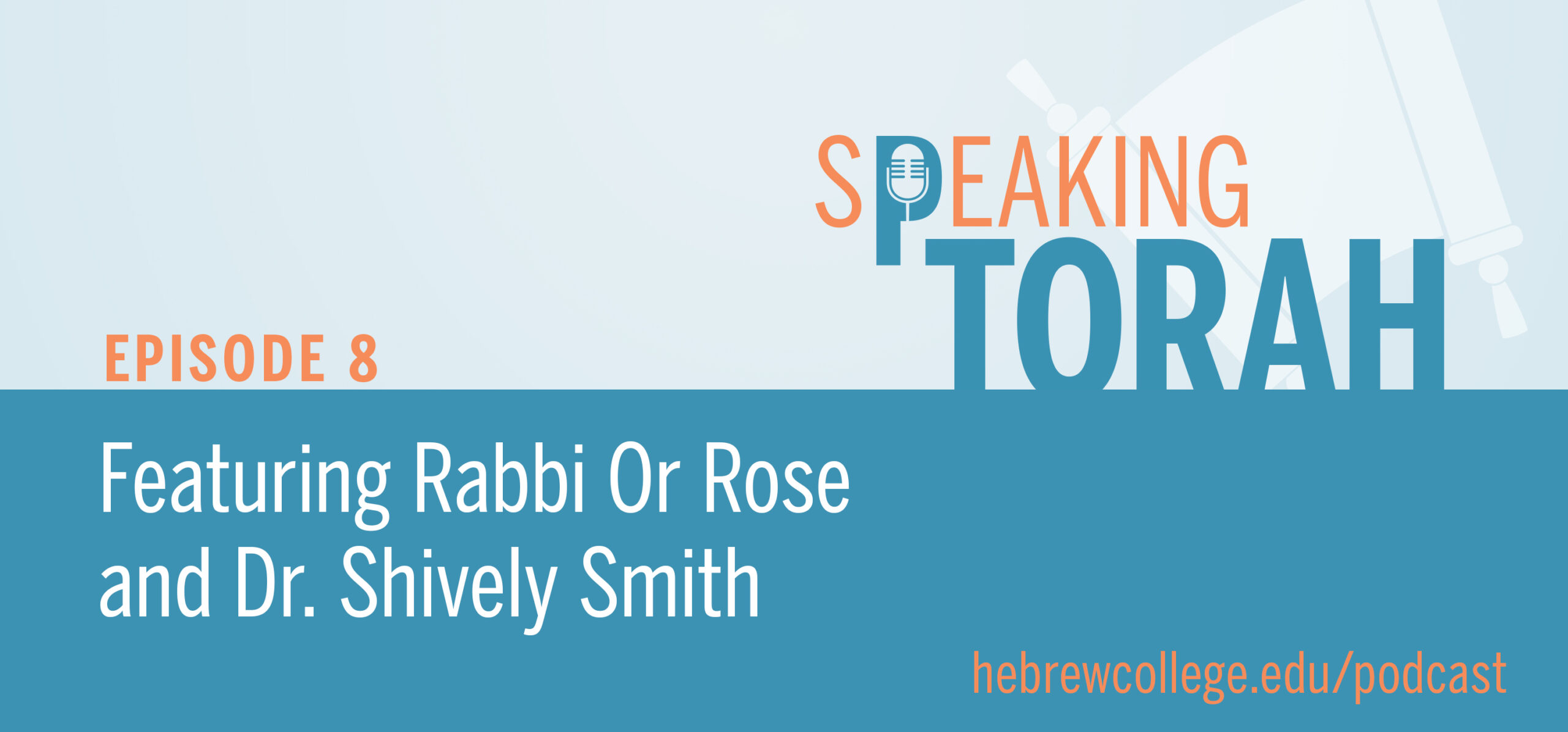
I found the piece so compelling because [it showed] an opportunity for a dialogue and a relationship that continued to have ripple effects in the lives of [Howard] Thurman and Reb Zalman, their students, and their students’ students. That felt like a bit of a carrying call and model of what it means for us to talk to each other and to create space for each other.
– Dr. Shively Smith
In this week’s episode, Rabbi Or Rose reflects on the influence of the esteemed theologian, educator, and Civil Rights leader Reverend Howard Thurman, as seen through the lens of the relationship between Reverend Thurman and Rose’s own spiritual teacher, Reb Zalman Schachter-Shalomi.
Rabbi Or Rose is the founding director of the Miller Center for Interreligious Learning and Leadership at Hebrew College. Rabbi Rose is the author or editor of various scholarly and popular works. Reading Or’s essay is Dr. Shively T.J. Smith, Assistant Professor of New Testament at Boston University’s School of Theology and self-described student of Howard Thurman’s teachings.
Tune in this week as Dr. Shively Smith reads us through and reflects on Rabbi Or Rose’s gratitude of Howard Thurman and the impact he had on the landscape of what is possible for interreligious harmony and cooperation — as well as how we can all carry on this work in our own religious practices.
What You’ll Discover from this Episode:
- How Howard Thurman served as a touchstone of inspiration for Or’s work in interreligious settings.
- Why anyone who values interreligious compassion has reason to be thankful to Howard Thurman.
- What we can all learn from Reb Zalman in this story about our assumptions of others, especially in a world where intolerance and hostility seem to be on the rise.
- How Shively sees Or’s essay embodying the legacy and lineage required to pass a story like this down through the generations.
- Thurman’s and Reb Zalman’s influence on the Jewish Renewal movement.
Featured on this Episode:
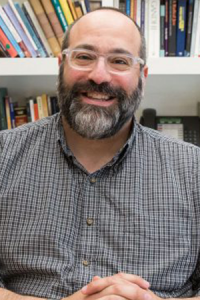
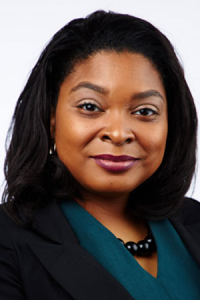
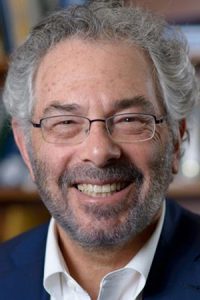
A special thank you for this episode’s musical contributions:
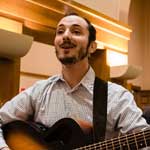
Jackson is an Ordination Candidate at the Rabbinical School of Hebrew College in Newton, MA. He grew up at Congregation Rodef Sholom in San Rafael, CA where he cultivated a love of Judaism, embolden with music, spirituality and justice.
Esa Einai (Psalm 121:1)
Music by Jackson Mercer
Guitar and Melody by Jackson Mercer
Harmonies by Cantor Rosalie Will, Ilana Sandberg, Rabbi Micah Shapiro, Rabbi Josh Warshawsky, Noah Diamondstein, Ryan Leszner, Eliana Light.

Marty Austin Lamar is a musician, writer, and thespian. Marty currently serves as The Director of Music and Creative Arts at Metropolitan African Methodist Episcopal Church in Washington, DC, and as a full-time lecturer and coordinator of the BFA Musical Theater program at Howard University.
Like Rain
From the Hebrew College Miller Center’s and
Interfaith Youth Core’s interreligious PsalmSeason concert in Fall 2020
Performed and composed by Marty Lamar
Welcome to Speaking Torah. I’m your host Rabbi Jeffrey Summit, Director of the Innovation Lab at Hebrew College. In this podcast, leaders from Jewish communities around the country read essays by Hebrew College Rabbis and leaders. These essays tackle the pressing issues of our world, in need to healing and hope, with Hebrew College’s signature compassion, creativity, and relevancy.
In this week’s essay, Rabbi Or Rose reflects on the influence of the esteemed theologian, educator, and Civil Rights leader Reverend Howard Thurman, as seen through the lens of the relationship between Reverend Thurman and Rose’s own spiritual teacher, Reb Zalman Schachter-Shalomi. Or’s essay is ready by Dr. Shively Smith.
Rabbi Or Rose is the founding director of the Miller Center for Interreligious Learning and Leadership of Hebrew College. Rabbi Rose is the author or editor of various scholarly and popular works including Rabbi Zalman Shachter-Shalomi: Essential Teachings, published by Orbis Books.
Dr. Shively T.J. Smith is Assistant Professor of New Testament at Boston University’s School of Theology. She’s written a monograph, Strangers to Family: Diaspora and First Peter’s Invention of God’s Household and articles on Howard Thurman, womanist hermeneutics and Christian testament studies in general.
Now, here is Shively Smith reading Or’s essay.
—
Thank You Dean Thurman: Remembering an American Spiritual Master.
April 10, 2021 marked the 40th anniversary of the death of the Reverend Howard Thurman, born 1899 to 1981, who was a towering figure in American religious and civic life. A distinguished African American preacher, writer, educator, and communal leader, he played a key role in the Civil Rights movement and was a pioneer in interreligious and cross-cultural engagement. Thurman’s book Jesus and the Disinherited, became a foundational text for many Civil Rights activists, including Martin Luther King, Jr. Reverend Thurman also served as a pastoral guide to several prominent movement leaders, including Martin Luther King, James Farmer, Jesse Jackson, and Pauli Murray.
I first learned of Thurman 20 years ago from my beloved teacher, Rabbi Zalman Schachter-Shalomi. Reb Zalman, an informal title he preferred, spoke of Reverend Thurman with great respect and admiration, referring to him lovingly as his Black Rebbe, Yiddish for Spiritual Master. Reb Zalman told the story of their initial encounter many times, using it to communicate to his students the importance of dignified and compassionate engagement across lines of differences.
To make a long story short, Reb Zalman enrolled in a graduate program in the Psychology of Religion at Boston University’s School of Theology in 1955. One day early in the fall semester the young rabbi stumbled into Marsh Chapel in search of a place to daven; pray. The young Hasidic rabbi was very hesitant about praying in a Christian house of worship, but could not find another available space at that early hour. And so, he decided to recite the morning service in the memorabilia room rather than in the main sanctuary or the smaller chapel, as both were adorned with Christian iconography.
A couple of days later, the dean of Marsh Chapel – none other than Howard Thurman – caught sight of the young rabbi in the memorabilia room, draped in tallit, the prayer shawl, and wrapped in tefillin, prayer boxes and straps, quietly chanting from his prayer book.
After engaging in a brief conversation with Reb Zalman about the latter’s prayer conundrum, Thurman came up with a creative solution. When the rabbi returned the following morning, the Dean ushered him into the chapel. To Reb Zalman’s surprise, Thurman had reconfigured the room.
He removed the large brass cross from the front of the chapel and on the lectern he placed two candles in brass candlesticks and an ornate Bible opened to Psalm 139, which includes the words, “Wither shall I flee from Thy presence?” in verse 7.
Without saying a word – or even disclosing his identity – the Dean communicated to Reb Zalman that he was a welcome guest in this foreign house of worship. The chapel would need to be reset for Christian worship, but for that one hour of the day, this sacred space was the rabbi’s to use for his prayers, “Wither shall I flee from Thy presence?”
In response to this gracious act of interreligious hospitality, when Reb Zalman finished praying, he returned the cross to its place, blew out the candles, and turned the Bible from Psalm 139, Thurman’s favorite biblical text, to Psalm 100; a psalm of thanksgiving. This simple but sophisticated textual exchange was a fitting prelude to the relationship these two spiritual virtuosos would forge over the course of the school year and beyond.
This anecdote, and the larger story of the relationship of these two esteemed figures, has served as a source of inspiration to me since I first learned about it as a young adult. It is a touchstone for my work in interreligious and other inter-group settings.
I feel great admiration for, and indebtedness to, Dean Thurman. Not only did he graciously welcome my teacher to the BU campus, but served as a generous and wise mentor to him for years to come, as he did for several other Jewish students.
Reb Zalman knew very little about Thurman when he entered BU, and by his own admission, originally mistook this kind, unassuming, and casually dressed Black man as the chapel’s janitor. By the time he left BU a year later, however, the rabbi considered himself a Thurman disciple.
To this day, one can identify the Reverend’s influence on the Jewish Renewal Movement Reb Zalman created and on other religious and educational endeavors the trailblazing rabbi undertook over his long and adventurous career.
In this time of extreme political polarization and resurgent racial and religious intolerance, Howard Thurman stands as a shining example of pluralistic leadership. Tragically, we continue to struggle mightily with how to hold our similarities and differences – racial, religious, political, et cetera – thoughtfully and humanely.
Thurman spoke eloquently about the interconnection and interdependence of all life, and the uniqueness of every person, community, and culture. More importantly, he walked the walk. Forty years after his death, this pioneering rebbe beckons us to the growing edge of life, to the place of boundless creative possibility, gently but firmly urging us to recommit ourselves to fashioning a more just, compassionate, and inclusive society.
Thank you, Dean Thurman.
—
Rabbi Jeffrey Summit: What did you think of Or’s essay?
Dr. Shively Smith: I found the title compelling and a place of pause for me. And I think the place of pause was in the gratitude that was shared at the very beginning. So, the notion that there is something that we need to be thanking Thurman for now – because there’s something that we have gifted us with in our living, our daily round, our relationality that we need to name I found so important.
So, before I even fully started reading it, I felt myself saying, you know, what is it that I need to be or that we as people who may be interested and are more and more compelled by the work of Thurman, grateful for. And I think I’m really thankful for how the piece names that very succinctly in a phrase.
Interreligious hospitality, so he talks about how Reb Zalman has recognized Thurman’s act of this interreligious hospitality in the way that he reset the space so that it was conducive to the religious life and experience of Reb Zalman. And that level of hospitality, it’s almost like resetting the table so that others can feel welcome, so that we can share the table together. It’s so powerful because I think the piece is right.
We are in a very unfortunate moment in which intolerance seems to be on the rise. But I also think it also means there is a corrosion of what it means to be hospitable to each other when the other is a stranger to you; stranger because you’re not used to sharing space with those particular embodiments, a stranger because you’re not used to sharing worship space with others, strangers because they have a different experience, strangers because they have a different perspective of the world.
We are out of practice with what it means to engage in acts of hospitality, in interreligious acts of hospitality that actually require us to do something as drastic and demonstrative as maybe resetting the tables of our spaces.
I found the piece so compelling because that moment created an opportunity for an exchange and a dialogue and a relationship that continued to have ripple effects in the lives of both of them, in the life of Thurman and in the life of Reb Zalman. And then their students; their students on both sides. That felt like a bit of a carrying call and a sort of model of what it means for us to talk to each other and to create space for each other.
The story itself was new for me, so how that relationship started and quite frankly this moment of resetting space was new for me and gives me a really powerful anecdote. Because we do, we know – so Thurman talks about this in detail in his autobiography that he really took seriously resetting the worship space to expand and make room for interreligious and intercultural gatherings.
And so, that was a major part of his project, both when he was at Howard University, when he was at Boston University, and even at Fellowship that was, for him, that was the obvious first step of thinking about, how do you design worship space that it opens up relationships, that it opens up this sort of common ground spiritual space?
So, Thurman doing it was not so much of a surprise for me because that’s not new. That’s part of how Thurman understood the work of community building and what real spirituality does. But the fact of seeing how that created this relationship was new and so beautiful. It sort of gives me a great anecdote for me to carry with me now as an example of why this was so important for Thurman.
Rabbi Jeffrey Summit: Was there a particular part of this essay that spoke to you?
Dr. Shively Smith: I really appreciate Rabbi Or giving us this story and what it means, the ways in which there is legacy and lineages of relationship. So, Rabbi Or as a student of Reb Zalman, Reb Zalman is a student of Howard Thurman. I’m a student of Howard Thurman’s students. And so, this very exchange to me represents the kinds of ripples in the water that Thurman saw back then was possible by these so-called small gestures.
And here we are decades later, generations later and we are benefiting from the gift of that initial ripple, that initial disruption, that initial decision to pull closer to each other in their spiritual lives and social lives versus to pull further apart, and I’m thankful for the demonstration of that.
—
Rabbi Jeffrey Summit: We asked Or, what made him write this essay?
Rabbi Or Rose: I wrote this piece in honor of the 40th yahrzeit, the anniversary of the death of Howard Thurman, the great African-American preacher, activist, teacher, and more. I did so largely because I wanted to give honor to Thurman and to my own teacher, Rabbi Zalman Schachter-Shalomi. I wanted to honor them because they were pioneers in the interreligious realm in which I work day after day.
I think it’s important for us, of course, to learn from the actions, both the successes and the challenges and the failures of those that came before us and to recognize that we stand on their shoulders. And so, I wanted to try and communicate my gratitude for their acts for bravery, of generosity, and of vision.
And specifically within the field of interreligious activism and the academic reflection on interreligious engagement. I wanted to try and contribute to a better understanding of our own genealogy, which is to say, how did we arrive at this moment? Who are the individuals and groups that came before us, that paved the way for the sacred work that we’re attempting to do today?
I first heard the story that I write about in the piece some 20 years ago from Reb Zalman, as he’s widely known. And he told it as a teaching on the need for dignified engagement across difference. And he was a consummate storyteller. And so, he drew not only from the stories of people of the past, and in his case especially from the Hasidic masters who he revered so much. But from other teachers and mentors that he encountered along the way.
And in fact, he told those stories with a certain kind of sacred attention because he believed that we needed to expand the cannon, if you will, of Jewish and interreligious stories about individuals that were exemplary in their behavior and from whom we could learn.
So, I love the story because, to me, it is a foundational story about hospitality. In the story, as I write, Dean Thurman welcomed the young Reb Zalman to the Boston University campus and understood that in order to make this student feel comfortable, he had to actually think inter-religiously. He had to think about what would be required to accommodate this student while maintaining his own religious integrity.
And so, I love the fact that in the story, Thurman rearranges the small chapel in the basement of Marsh Chapple and with attention to the spiritual aesthetics of the space invited Reb Zalman without having to say a word. It’s through his deeds. It’s through his actions that he demonstrates his hospitality.
And then that Reb Zalman has the wherewithal, even at that young age, to reciprocate. He understands that he’s received a tremendous gift and so, as I say, at the end of each morning service that he prayed in that space that was set for him, he would return the cross to the center of the room. He would blow out the candles. And then, with a wink, he would turn the bible from Psalm 139 to Psalm 100 as a way of saying, without having to say it explicitly, thank you.
So, it’s a text that in fact we use at the Miller Center regularly in our teaching of interreligious leaders across the lifespan.
The other things that I want to say about the piece is that it’s not only an interreligious piece, but it’s also a piece about race. And one of the elements that I think is important in Reb Zalman’s rendering of the story is that he admits to his own biases and he repeats that decades later when he shared the story with other people.
I think that was a very conscious decision. Again, he was a very thoughtful and experienced storyteller. And so, long after the story, he would say, “I need to tell you that in 1955, given my life experience, given societal norms, given my biases, I assume that this unassuming, warm, welcoming person, this African-American man dressed very casually at six o’clock in the morning was the janitor. I had no idea that I was in the presence of one of the great American spiritual masters of the 20th century.
And I think it’s important that he told that story and gently prodded us, all of us who are reading or hearing, to think about our own assumptions, about our own biases, about who can be a teacher, who can be a mentor, and are we open to hearing and learning from them and becoming more transparent about what we think about individuals and groups of people before we even meet or encounter them.
Rabbi Jeffrey Summit: What did it mean when you wrote, “The rowing edge?”
Rabbi Or Rose: Among the many prayers and poems that Thurman wrote is a piece called the growing edge. And in it, he talks about the need, in the darkest and most difficult times to look to the growing edge. And he uses the example of the birth of a child. And he says, “The birth of a child, any child, is the incarnation of what it means to stretch ourselves and experience the possibility of renewal out of the depths of despair.”
Elsewhere in the piece he says, “It is the move that we make when we have taken what we think is the last breath and we dare to take one more, when the lung is exhausted.” And so, Thurman was a person who experienced unimaginable bigotry in his lifetime.
It’s important to remember that he was raised by, among others, a grandmother who herself was a slave. And so, he spanned a century of progress, but also of great tumult and of ongoing bigotry and racism. And we know that we are still absolutely struggling to try and live into the highest values of the United States of America.
And so, we are struggling systemically, communally, interpersonally with issues of race, of bigotry. We still experience, on a weekly basis, violence that is inspired or justified by hate of one group or another based on their race, their ethnicity, their religion. And so, Thurman was, at once, both a gentle, inviting, poetic figure like we see in the story with Reb Zalman.
But he was also a very strong, resilient, outspoken voice for justice. And part of what he believed in, which animates what I try and do in my own work, is that we need to try and turn inward and then turn outward. We need to spend time examining who we are and who we wish to be.
He was a contemplative. He was a person that believed deeply in the power of prayer and of meditation. He spent a good deal of time in nature. And it was out of the depths of that inward exploration that he turned outward to the world with what he understood was a refined and deliberate message of justice, compassion, sustainability. So, those are some of the things I mean by invoking that expression.
Through his mentorship of Reb Zalman, he planted – to use the image of the growing edge – seeds that Reb Zalman then developed into his vision for Jewish Renewal, which in turn, of course, influenced the Jewish Renewal Movement proper, but also many other spiritual renewal movements within the broader Jewish community, including Hebrew College. Because Reb Zalman almost immediately integrated several of Thurman’s ideas and pedagogic techniques in his own teaching.
For example, Thurman was famous for combining lectures in a typical classroom with what he called spiritual labs, where once students had been engaged in a more academic oriented classroom experience, they were also required to come a second time during a given week to explore how those ideas might be embodied through music, through dance, through poetry. And those are all characteristic elements of the Renewal Movement today and other renewal efforts.
And Thurman was a person that was experimenting with that long before Reb Zalman had a notion that he was going to create the Jewish Renewal Movement.
Rabbi Jeffrey Summit: How do you feel about Shively reading your piece?
Rabbi Or Rose: I am delighted and honored that Shively Smith is reading my piece. She is a person that is deeply committed to interreligious cross-cultural interracial engagement and a person too that is a dedicated student of Howard Thurman. So, given all of those factors, I felt like she was an ideal person to read the piece.
I also think it’s important to state that a piece written by a man that is a story about two men from the past begs for the engagement of women in this work. And Shively is an amazing woman, scholar, religious leader, bridge builder, and so I’m really thankful that she said yes enthusiastically and that we are deepening our friendship and our collegial relationship.
—
Rabbi Jeffrey Summit: Thank you for joining us for this episode of Speaking Torah. We want to thank Emily Hoadley for our logo, and Hebrew College Rabbinical student and composer Jackson Mercer for our theme music Esa Einai. To learn more about Hebrew College, please visit hebrewcollege.edu/podcast. And remember to subscribe, like, and rate Speaking Torah on Apple Podcasts, Spotify, or wherever you listen to podcasts.
We’ll leave you this week with Like Rain, composed and performed by Marty Lamar, from the Hebrew College Miller Center and Interfaith Youth Core’s Interreligious Psalm Season concert in the fall of 2020. Learn more about this project at ifyc.org/psalmseason. I’m your host Rabbi Jeff Summit. See you next time on Speaking Torah.
Enjoy the Show?
- Don’t miss an episode, follow the podcast on Spotify, Apple Podcasts, Stitcher, or RSS.
- Leave us a review in Apple Podcasts.


